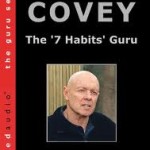 Author of many books, most notably the 1989 book, “The 7 Habits of Highly Effective People,” Stephen Covey, reportedly died at the age of 79. The well-known and respected business self-help guru and author was read by millions around the world before his death.
Author of many books, most notably the 1989 book, “The 7 Habits of Highly Effective People,” Stephen Covey, reportedly died at the age of 79. The well-known and respected business self-help guru and author was read by millions around the world before his death.
According to reports Covey on Monday this week at the Eastern Idaho Regional Medical Center in Idaho Falls, Idaho. Based on a statement from his family, Stephen Covey died of complications from injuries sustained in a bicycle accident in Utah three months ago.
At the time of the injury on April 19th, Covey was knocked unconscious when he crashed on his bicycle while riding downhill. Covey was wearing a helmet at the time of the accident but sustained a head injury none the less.
Born in Salt Lake City on the 24th of October in 1932, Covey leaves behind his wife, Sandra, nine children and, 50 grandchildren. Stephen Covey was a devout Mormon, and during his youth spent time as a missionary in the U.K. During his education, Covey earned an undergraduate degree from the University of Utah in 1952, a master’s in business administration from Harvard University in 1957, and a Ph.D. in organizational behavior from Brigham Young University in 1976 where he reportedly taught 24 years.
Known worldwide for his writing, Covey sold over 20 million books in 38 languages around the world. One of his most popular titles was “The 7 Habits of Highly Effective People.” Covey followed his success with other titles including “First Things First,” “Principle-Centered Leadership” and “The 7 Habits of Highly Effective Families.”
Something of a legend in the business world for leadership, motivation, time management and organization, Covey served as vice chairman of Salt Lake City-based Franklin Covey Co., an international business-consulting firm and maker of Franklin daily planners and the Franklin Covey Planning System.
In 2004, Covey released the next evolution of his earlier work and titled it, “The 8th Habit: From Effectiveness to Greatness.” Reportedly, in the book, Covey spoke about finding one’s “voice” and using their individual talents, passions, needs and conscience to “inspire others to find theirs.”
![Herbal Reference Substances are Key to Everyday Products <!-- AddThis Sharing Buttons above -->
<div class="addthis_toolbox addthis_default_style " addthis:url='http://newstaar.com/herbal-reference-substances-are-key-to-everyday-products/3512112/' >
<a class="addthis_button_facebook_like" fb:like:layout="button_count"></a>
<a class="addthis_button_tweet"></a>
<a class="addthis_button_pinterest_pinit"></a>
<a class="addthis_counter addthis_pill_style"></a>
</div>When it comes to quality control testing and the development of new products, Botanical Reference Materials (BRMs), also known as Herbal References are critically important. To help companies ultimately obtain all-important FDA approval, the Food and Drug Administration provides in its guidance a recommendation that […]<!-- AddThis Sharing Buttons below -->
<div class="addthis_toolbox addthis_default_style addthis_32x32_style" addthis:url='http://newstaar.com/herbal-reference-substances-are-key-to-everyday-products/3512112/' >
<a class="addthis_button_preferred_1"></a>
<a class="addthis_button_preferred_2"></a>
<a class="addthis_button_preferred_3"></a>
<a class="addthis_button_preferred_4"></a>
<a class="addthis_button_compact"></a>
<a class="addthis_counter addthis_bubble_style"></a>
</div>](http://newstaar.com/wp-content/uploads/2021/02/Achillea_millefolium_flowers-100x100.jpg)
![Quality Electrochemical Biosensors are Critical for Medical, Food and Chemical Industry <!-- AddThis Sharing Buttons above -->
<div class="addthis_toolbox addthis_default_style " addthis:url='http://newstaar.com/quality-electrochemical-biosensors-are-critical-for-medical-food-and-chemical-industry/3512086/' >
<a class="addthis_button_facebook_like" fb:like:layout="button_count"></a>
<a class="addthis_button_tweet"></a>
<a class="addthis_button_pinterest_pinit"></a>
<a class="addthis_counter addthis_pill_style"></a>
</div>A number of industries have, at their core, a need to frequent or even continuous analysis of biological media. These include the medical and pharmaceutical fields, biotech firms, and food and chemical companies. To maintain quality standards and develop new products, these industries rely heavily […]<!-- AddThis Sharing Buttons below -->
<div class="addthis_toolbox addthis_default_style addthis_32x32_style" addthis:url='http://newstaar.com/quality-electrochemical-biosensors-are-critical-for-medical-food-and-chemical-industry/3512086/' >
<a class="addthis_button_preferred_1"></a>
<a class="addthis_button_preferred_2"></a>
<a class="addthis_button_preferred_3"></a>
<a class="addthis_button_preferred_4"></a>
<a class="addthis_button_compact"></a>
<a class="addthis_counter addthis_bubble_style"></a>
</div>](http://newstaar.com/wp-content/uploads/2020/10/Electrochemical-Biosensor-100x100.jpg)
![Company Develops Industrial Mixers Well-Suited for both Fragile and Explosive Products <!-- AddThis Sharing Buttons above -->
<div class="addthis_toolbox addthis_default_style " addthis:url='http://newstaar.com/company-develops-industrial-mixers-well-suited-for-both-fragile-and-explosive-products/3512071/' >
<a class="addthis_button_facebook_like" fb:like:layout="button_count"></a>
<a class="addthis_button_tweet"></a>
<a class="addthis_button_pinterest_pinit"></a>
<a class="addthis_counter addthis_pill_style"></a>
</div>Industrial drum mixers are normally applied to blend mixes of varying viscosities such as adhesive slurries or cement. Some of these mixers have the capability of blending mixes of very different particle sizes such as fruit and ice cream, and gravel and cement slurry. The […]<!-- AddThis Sharing Buttons below -->
<div class="addthis_toolbox addthis_default_style addthis_32x32_style" addthis:url='http://newstaar.com/company-develops-industrial-mixers-well-suited-for-both-fragile-and-explosive-products/3512071/' >
<a class="addthis_button_preferred_1"></a>
<a class="addthis_button_preferred_2"></a>
<a class="addthis_button_preferred_3"></a>
<a class="addthis_button_preferred_4"></a>
<a class="addthis_button_compact"></a>
<a class="addthis_counter addthis_bubble_style"></a>
</div>](http://newstaar.com/wp-content/uploads/2020/06/bandeau-sofragir2-100x100.jpg)